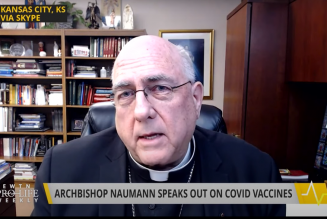By Dr. Jeff Mirus ( bio – articles – email ) | Aug 30, 2024
Recent observations by Cardinal Luis Antonio Tagle suggest that the charge that Christian missionaries are agents of colonialism has not yet been laid to rest (see Cardinal Tagle defends missionaries). In reality, this is an accusation typically made by those who are themselves “colonializing” by trying to turn the third-world poor into agents of, or supports for, Western secularism.
Thomas Mirus recently called my attention to a case in point: African Archbishops: ‘They Are Sending Us Missionaries of Evil’. We have seen this again and again with the rising tide of secularization in the West over the past seventy-five years. It is always the Christian missionaries who are accused of shackling poorer populations to a self-serving “colonialism”, whereas the so-called enlightened advocates of human liberty are actually seeking to enslave them to vice—to protect them not from the sovereignty of a particular State but from the sovereignty of God.
“It is just like the missionaries who went all over to evangelize,” said Archbishop Renatus Leonard Nkwande of Mwanza, Tanzania, except that the West is now “sending us missionaries of evil.”
Leave me alone?
We ought to think very clearly about this. No good person leaves others entirely alone, as if he or she cannot be of service to others in some way. The important question is whether we try to help or harm others, and the greatest harm we can do is to attempt to separate them from God, that is, to enslave them to evil. Moreover, I have never heard of any Christian missionary who, when motivated to engage in spiritual works of mercy, was not also committed to the corporal works of mercy. The Christian sees the human person whole, which is to say he sees others as “persons” with their own dignity, and with their own aspirations to participate in every form of goodness, all of which comes from God, and all of which is understood properly in the light of what we call truth.
Truth, after all, is simply the mind’s grasp of reality. Insofar as a person is not alienated from what is real, he properly seeks the Good. Insofar as he is alienated from what is real, he falls into evil, which has no being of its own, for it is simply the absence of a due good—a dreadful distortion of reality which can only weaken, enslave and ultimately destroy all those who embrace “what is not”. It is difficult for the human mind and will to overcome the attractions of a distorted (or, better, an empty) reality; it is difficult for the human person to clear away the distortions of human passions and human cultures to first apprehend and then commit himself to the good. The Christian missionary seeks above all to do every kind of good to others so that others might be led by this goodness to the truth of Jesus Christ.
In his first letter to the Corinthians, St. Paul explained it this way:
For though I am free from all men, I have made myself a slave to all, that I might win the more. To the Jews I became as a Jew, in order to win Jews; to those under the law I became as one under the law—though not being myself under the law—that I might win those under the law. To those outside the law I became as one outside the law—not being without law toward God but under the law of Christ—that I might win those outside the law. To the weak I became weak, that I might win the weak. I have become all things to all men, that I might by all means save some. I do it all for the sake of the gospel, that I may share in its blessings. [1 Cor 9:19-23]
This is not selfishness, but a matter of meeting people where they are, living among them, and working with them for every form of truth and goodness. It is not exploitation; it is sacrifice.
Shaking the dust
Moreover, what is the Christian missionary’s method of operation? Do Christian missionaries demand government intervention and insist on forcible conversion? Do they try to make those they serve dependent on tobacco, or drugs, or sensual pleasures, or even baby formula? Do they break up families to create docile work forces? Do they initiate local populations into orgiastic “rites of initiation” to destroy their spirits and attach them to sin? Do they use them for pleasure, personal enrichment or political gain?
No, indeed. And if they can gain no confidence among those they serve, they simply follow the the advice of Jesus Christ: “If anyone will not receive you or listen to your words, shake off the dust from your feet as you leave that house or town” (Mt 10:14; Lk 9:5). Yes, this is a testimony against those people, but it does not seek to leave them worse off than before.
Even granted that Christian missionaries can sin, or be mistaken about ways and means, or extend themselves to the point of losing their own strength to serve, we must ask whether the kind of conversion they offer is a manipulation made possible by attachment to vice, or an introduction to a wholesome human sustainability? The record on this question is unmistakably clear. The Catholic missionary is not subjecting those in mission territories to new kinds of government control, for the Catholic Church is not a temporal government. The Catholic missionary is not exploiting those in mission territories as sources of profit, for the Church does not claim rights to natural resources and she has nothing to sell.
Therefore, what does the Christian missionary offer? Is it not service, friendship, community, trust, faith, hope and love? This is nothing like the offerings of today’s secular missionaries!
Perhaps St. Paul put it best in his letter to the Romans:
More than that, we rejoice in our sufferings, knowing that suffering produces endurance, and endurance produces character, and character produces hope, and hope does not disappoint us, because God’s love has been poured into our hearts through the Holy Spirit which has been given to us. While we were still weak, at the right time Christ died for the ungodly. Why, one will hardly die for a righteous man—though perhaps for a good man one will dare even to die. But God shows his love for us in that while we were yet sinners Christ died for us. Since, therefore, we are now justified by his blood, much more shall we be saved by him from the wrath of God. [Rom 5:3-9]
Throughout the world, all kinds of governments, organizations and individuals seek to use those less powerful than themselves to preserve and enhance their own comforts, their own pampered positions, and their own falsehoods, all of which are most often rooted in vice. But St. Paul describes the Christian goal of mission. It is not to use others for personal, political, social or economic gain, but to free them from bondage to sin. It is to give them the liberty of the sons and daughters of God.
Sound Off! CatholicCulture.org supporters weigh in.
All comments are moderated. To lighten our editing burden, only current donors are allowed to Sound Off. If you are a current donor, log in to see the comment form; otherwise please support our work, and Sound Off!

There are no comments yet for this item.










